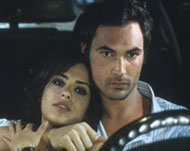London showcases Arab filmmakers
Hoping to raise the profile of contemporary Arab cinema in Britain, London’s British Academy of Film and Television Arts has launched the first annual Arab Film Weekend to both accolades and criticism.

Screening eight films – all made in the past two years – from Egypt, Lebanon, Syria, Iraq, Morocco and Algeria, the festival was arranged “to provide a showcase for the diversity and the breadth of creativity that exists within the Arab world”, Ali Jaafar, one of the festival’s programmers, said.
The weekend represented something of an experiment, examining whether art can provide a fresh perspective of life in the Arab world, one distinct from the relentless media images of war and violence that are commonly offered to the British public.
World Cinema festivals are hardly unique in London, but what made the weekend significant was the fact that Arab cinema is virtually unknown in the UK, despite a considerable British-Arab population of around 500,000.
Organised by the Zenith Foundation, a UK-based organisation dedicated to promoting contemporary Arab arts, the weekend followed in the tradition of a retrospective of a decade of Arab cinema held last year at the National Film Theatre.
Cultural exchange?
Mona Tayara-Deeley, CEO of Zenith Foundation, believes the lack of Arab cultural representation in Britain has as much to do with British Arabs as it does with the British public in general.
“We just feel that there’s a huge gap whereby the region is constantly reported in the news, but there is no parallel track of cultural awareness. And it’s not the fault of cultural ignorance. In a way it’s our fault because we just never participate in this way.”
 |
|
Lebanon’s Perfect Day deals with |
While the weekend was a success in terms of attendance, not everyone was convinced that Zenith achieved what it set out to.
Alaa Al-Shroogi, an audience member, told Aljazeera.net: “If you want a real cultural exchange, then you have to hit the general public. I don’t think they hit the general public.”
While it is true that a majority of the people in attendance were British Arabs, the challenge for both festival organisers and filmmakers is not just to attract a diverse audience, but more importantly to address the issues faced by Arab societies without simply exploiting or stereotyping those issues.
Khalil Joreige, Lebanese director of Perfect Day, criticised the often unimaginative subjects chosen by Arab filmmakers.
“Most of the films from my region are dealing with relationships with women, with Islam, terrorism … but I want my films to be about what’s happening in my life.”
Joreige’s solution was to concentrate on universal human experiences, and only incidentally set them within the context of post-civil war Beirut.
 |
|
A still from the film Zaman |
Zaman: Man of the Reeds, a previously unknown film from Iraqi director Amer Alwan, was one of the festival’s strongest films for the same reason.
The film, with understated beauty, tells the story of Zaman, an elderly man living modestly in Iraq’s southern marshes, and his long journey to the chaotic streets of Baghdad to buy medicine for his ailing wife.
It focuses on his raw emotional experiences, referencing the impending invasion of Iraq only obliquely, through radio broadcasts and the occasional sound of military jets passing overhead.
Challenging prejudices
The weekend’s opening night screening, in contrast, failed to capture the same emotional subtlety. Jocelyn Saab’s Dunia, though highly acclaimed, uses largely superficial references to Arab cultural icons to tackle the issue of how modern Egyptian women view themselves in a paternalistic society.
It employed a surprisingly “orientalist” approach to music, dance, poetry and religion, and often came across as a product of the very prejudices it set out to challenge.
|
“You hear a lot in the Arab world about wanting some kind of cultural renaissance but that can only happen if there’s a partnership between [creative forces] and money” Mona Tayara-Deeley, |
Tayara-Deeley believes critics should take current social and financial conditions into account. “[Arab filmmakers] are restricted by the amount of funding they can get for their films … it is definitely a problem … the circumstance in which directors are operating should be borne in mind.”
She hopes to see more works by Arab filmmakers and producers in the years to come.
“You hear a lot in the Arab world about wanting some kind of cultural renaissance,” she lamented, “but that can only happen if there’s a partnership between [creative forces] and money.”
Realising world audiences will no longer be satisfied with obvious, two-dimensional depictions of Arab society, Jaafar called for more nuanced representations of life in the Arab world.
“The Arab Street does not exist,” he said. “The Arab Street is made up of canals and locks and alleyways and buildings and beaches … It’s not only what they read in the papers, it’s also life, art, cinema, culture and vitality.”